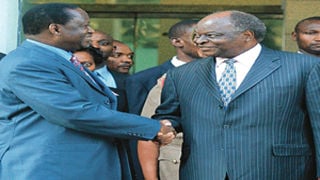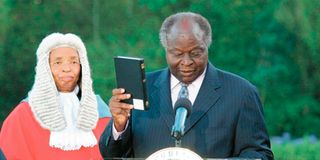
President Kibaki shakes hands with Raila Odinga (right) outside Harambee House in Nairobi in January, 2008.
|Politics
Premium
The day Kibaki snubbed UK Premier for siding with Raila
What you need to know:
- Only Mr Odinga honoured the invitation to London, where he revealed the actual man behind the grand coalition.
- Leaked American cables later said Kibaki’s move helped him dodge a trap.
Perception of close political ties between Opposition leader Raila Odinga and the British government forced President Mwai Kibaki to snub then UK Prime Minister Gordon Brown in 2008.
Mr Kibaki declined an invite to London alongside Mr Odinga after the formation of the Grand Coalition Government to express displeasure with the UK for allegedly siding with the opposition in the 2007 presidential election and the subsequent violence after the opposition rejected President Kibaki’s controversial re-election.
His decision to snub the meeting was also seen as a revenge after former UK Prime Minister Tony Blair twice rejected his request for a visit to explain his government reform agenda at the height of his fallout with Mr Odinga.
Mr Blair served as UK Prime Minister from 1997 to 2007 while Mr Gordon served between 2007 and 2010. They were both perceived to have a close ties with Mr Odinga and were accused of funding a push for constitutional reforms in the country.
Mr Kibaki’s side of the grand coalition government also had troubled diplomatic relations with the United States after the then President Barack Obama’s administration threatened select ministers and senior officials with sanctions for obstructing the constitutional reform process in 2009.
Mr Kibaki personally fired a letter to President Obama, terming the sanction threats unprocedural. The details are contained in former Head of Public Service Francis Muthaura’s memoir – A Moving Horizon.
The book reveals that Mr Kibaki’s administration had constrained foreign relations with the US, UK and European Union (EU) following his bitter fallout with Mr Odinga after the failed 2005 referendum.
Mr Muthaura recalls that there was growing pressure from the West to Kenya to implement constitutional reforms ahead of the 2007 General Election.
“It became apparent that there was growing contact between Western countries led by the USA, UK and Germany, and the Opposition groups led by the ODM leader, Raila Odinga, and that those countries had increased their financial and other support to the numerous NGOs who had pegged their strategies on the country's reform agenda,” writes Mr Muthaura.
Senior government officials were rattled by the funding and alleged dalliance between Mr Odinga and the West. They advised President Kibaki to visit London for direct engagement with Mr Blair and other key UK government officials.
In the meeting, Mr Kibaki was advised to convey his government position and his role in championing for reforms.
“The direct message was for better appreciation by the British authorities, who appeared to have a distorted image of the policies the Kibaki Government was implementing,” he recalls.

President Mwai Kibaki takes oath of office at State House in Nairobi on December 30, 2007 after being declared the winner of the disputed presidential election.
“Two attempts to secure the date failed. We felt that the main Western powers were totally biased in the interpretation of the political differences between the competing political parties as well as the NGOs' compromised positions presented as people's preferences,” he writes.
Officials in Mr Kibaki administration felt that the reasons given for the declines were not satisfactory. They felt the UK did not just want to meet Mr Kibaki.
In the first request, Mr Kibaki was to visit London when he was on his way to or back from New York for the 2005 United Nations General Assembly. The second was a request for an official visit to London.
“The reasons given by the British Government for failure to secure a date for the visit were not entirely satisfactory to us. The reason given for declining (the first visit) was that too many Heads of State and Governments were asking for such requests so much that it had become unsustainable,” he recalls.
“The reason given for declining (second visit) was that the Prime Minister was involved in political campaigns at the time, which made it difficult to schedule high level visits. In both cases, no alternative dates or period was suggested by the British authorities,” the book states.
The President’s circle was, however, surprised when Mr Brown invited both Mr Kibaki and Mr Odinga to London soon after the formation of the grand coalition government.
“Odinga responded positively, but President Kibaki declined with the excuse that the European weather was not good for him at that time. Apparently, he was not happy with the position taken by the British Government during the campaigns leading up to the 2007 General Election,” says Mr Muthama.
Mr Kibaki was also unhappy with what appeared to be their alliance with the opposition during the post-election violence and the negotiations that led to the 2008 peace accord.
Mr Odinga, while in the UK in July 2008, was quoted by the international press praising Mr Brown for his role in resolving the presidential election outcome dispute.
"Unknown to many people, it was Prime Minister Gordon Brown who started up the process of negotiations through phone calls, one to me, the other to President Kibaki, during which he asked us to agree that he could play a role behind the scenes to broker negotiations," Mr Odinga said on July 23, 2008 after holding talks with Mr Brown at his Downing Street office in London.

Dr Francis Muthaura (second right), with his wife Rose (right), together with Public Service Cabinet Secretary Mr Moses Kuria, former Public Service CS Prof Margaret Kobia and Dr Henry Chakava, the chairman of East African Educational Publishers (EAEP), during the launch of Dr Muthaura’s memoir, ‘A Moving Horizon,’ at the Nairobi Serena Hotel, on November 2, 2023.
"That phone call is what started it all off, ending up with the establishment of a panel of eminent persons led by the former UN Secretary-General Dr Kofi Annan,” he was quoted by Reuters.
America’s leaked diplomatic cables that became public in 2011 revealed that the British Government accepted President Kibaki’s visit to London so as to “deliver tough political messages”.
The cable also claimed that the President had sought the invitation for over one year.
Then Government spokesman, Dr Alfred Mutua, would later deny the claim, saying that it was the UK that had invited the President but he failed to go due to other commitments.
The cable, dated January 12, 2010, quoted then UK’s Horn of Africa team leader, Ms Chloe Hamborg, terming the visit a “difficult decision” and the visit would also be used to “extend the UK’s diplomatic leverage” in Kenya.
“It was a ‘difficult decision’ to extend the invitation to Kibaki but indicated that the UK Government ultimately decided in favour of the visit in order to ‘deliver tough political messages’ (including through a one-hour one-on-one meeting with UK Prime Minister Brown) and to ‘extend the UK’s diplomatic leverage’ in Kenya,” the cable claimed.
In 2009 at the country geared for the 2010 referendum that was backed by both Mr Kibaki and Mr Odinga, the US felt some of the ministers were against the clamour for constitutional reform.
“Ambassador Johnnie Carson, the US Assistant Secretary of State for African Affairs, wrote letters to select ministers and senior civil servants warning them that the US government would impose individual sanctions against them if they were considered to be obstructive of the constitutional reform process,” he writes.
The government considered the threats as an unacceptable attack on the country’s sovereignty.
“President Kibaki reacted swiftly by writing to President Barack Obama protesting the unprocedural manner in which those letters were written and how they were communicated. He informed the US President that it was out of step for an official of the US Government to write warning letters to Kenya Government officials as though the latter were accountable to the US Government,” he discloses.
Mr Kibaki told Mr Obama that if the US government had any concerns about any of the Kenya Government officials, they should communicate through the Ministry of Foreign Affairs or directly to him.
Mr Odinga largely remained in good diplomatic relations with the West until last polls, when he accused the US and other Western nations of siding with President William Ruto.
Mr Odinga and his allies accused the US of turning a blind eye to electoral questions surrounding the August 9, 2022 polls and police brutality against opposition demonstrators.





